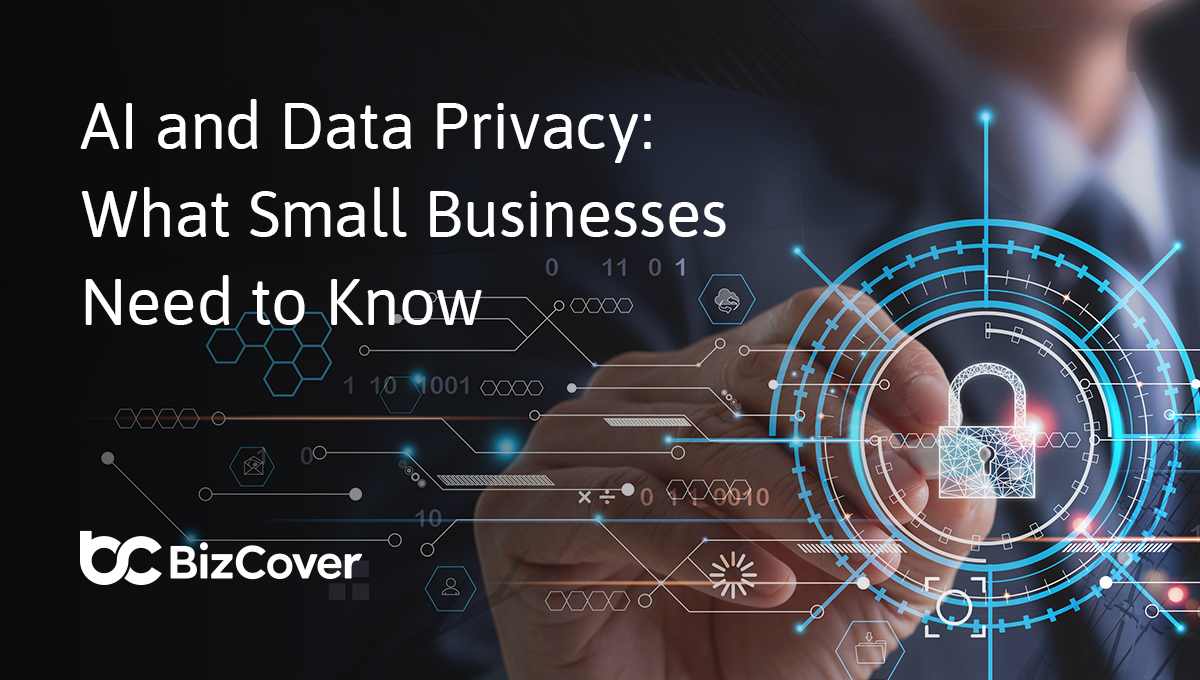AI and Data Privacy: What Small Businesses Need to Know
Artificial intelligence is more accessible than ever. It’s not just big corporations that can capitalise on these new technologies; small businesses can, too.
There are plenty of ways small business owners can leverage AI to boost productivity, streamline workflows, optimise operations and improve customer service quality. However, there are certain risks SMEs need to be aware of being jumping on the AI train.
Making sure that your clients’ data and information is kept secure and out of the hands of cybercriminals is one of the most important things to consider. Are you contemplating using AI to help operate your business, or are already using AI? Then there are a few things you should keep in mind when it comes to data privacy and cybersecurity.
How and why AI uses data
AI can help SMEs more efficiently run their small businesses. But in order to do that, AI needs data to learn patterns, make decisions and automate processes. A small business owner could use AI for a variety of different things. These might include streamlining operations, gaining insights into customer buying habits, or enhancing the customer experience.
For example, AI-powered tools could analyse peak seasonal trends and optimise inventory by predicting demand. In this way, a business could feed AI data and then use the output to improve efficiency, increase revenue and, ultimately, remain competitive.
However, any AI tool is only as good as the data it is being fed. Which means you need to make sure the quality of the data you’re working with is of the highest standard for the best results.

Risks of data mismanagement
Proper data management is extremely important for small businesses that use AI-powered tools. Not only does this have ethical implications, but mishandling data can lead to consequences such legal penalties, financial losses, and reputational damage. Here are a few risks you should consider when using AI in your business operations.
Data breaches
A data breach occurs when an unauthorised person gains access to sensitive information. This includes personally identifiable information (PPI) or financial details.
A data breach can have a severe impact on a business. Cybercriminals can use client details to commit crimes like identity theft or complex phishing scams. They could be sold to the highest bidder on the dark web. Either way, your business could face serious consequences if a data breach occurs because you have not put the right kind of protective measures in place.
Overcollection of data
You may think that the more data you have, the better results your AI-powered tools will be able to provide you with. While large data sets can be helpful and used for various purposes, big isn’t always better
Collecting too much data could result in storage and data management problems, while also raising privacy concerns for clients. The business could lose your customer’s trust if they feel like their data is being unnecessarily collected and used.
On top of this, businesses that collect more data than needed face greater risks of data breaches. They may even face regulatory scrutiny from regulators like the Office of the Australian Information Commissioner (OAIC). The Australian Privacy Principles specifically mention the need for data minimisation, citing that more data than is reasonably needed must not be collected, and that the collected data may only be used for the purposes as consented to by the consumer.
Non-compliance
When handling customer data, it’s critical that you do so according to Australian privacy laws and guidelines. Failing to meet your legal requirements concerning correctly handling customer data could expose you to legal battles and steep fines.
In addition to this, it’s important for you to consider the implication for any other organisation you’re working with. For example, if you have an agreement with a larger business, but are then found to not meet the minimum data handling and privacy requirements, you could risk losing that organisation’s business as well as future contracts and partnerships.
Understanding data privacy laws in Australia
Some recent changes to Australian privacy laws may affect your small business. This is something to consider if you are using or are thinking of using AI in your daily operations. While the new laws do not target small businesses with an annual turnover of less than $3 million, there are exceptions to the rules. For a full list of the different types of businesses covered by the Privacy Act, visit the OAIC website. You can also complete a short questionnaire online to confirm whether or not your business is covered by the Act.
Here are just some of the new changes that could impact your business:
- AI disclosure: If your business uses an AI system, you must now disclose how that system uses personal data so that customers understand how their data is processed, stored and protected.
- Automated decisions: If you use an AI system to make decisions, then you must disclose how the data is used and how these automated decisions are made based on that data. This could affect a range of contexts, such as customer service, marketing or hiring.
- Data protection: Businesses must take reasonable steps to secure personal information at an organisational and technical level.
- The Children’s Online Privacy Code: If your business offers online or electronic services that are used by children, then you will need to follow the new Children’s Online Privacy Code as laid out by the Office of the Australian Information Commissioner (OAIC).
- Statutory tort: The introduction of a statutory tort means that individuals can seek compensation if their privacy rights have been violated.
For more information on changes to the Privacy Act (1988), make sure you read our blog: How will the new Australian privacy laws affect your small business?

Steps to protect data when using AI
Using AI to help run your business can have huge benefits. But it’s also important to consider the ways you need to responsible handle and store data. Here are a few steps you can take to make sure the data you use is adequately protected:
- Understand privacy laws: First and foremost, you should have a through understanding of your responsibilities under Australian privacy laws so that you know what your legal obligations are.
- Implement data minimisation practices: Make sure you’re only collecting the data you need, and regularly review and delete outdated data.
- Obtain clear consent from customers: Inform customers about what data is being collected and how it will be used.
- Ensure transparency: If you are using AI systems in your daily operations, make sure that AI processes are clearly explained to customers and that they have the option to opt out of data collection.
- Work with compliant vendors: Do your research and ensure that you’re only working with suppliers and vendors who have strong data privacy policies in place.
- Develop a data breach response plan: If a data breach does occur, make sure you have a clear and actionable response protocol in place that can help to minimise damage. Part of the response plan could include Cyber Liability insurance, which can help to cover losses from claims arising from data breaches, business interruption and remediation costs following an actual or threatened data breach.
Protecting your customers’ data in the age of AI
AI can offer SMEs great opportunities to streamline business operations and improve overall customer experiences. But it’s important to remember the risks associated with handling data to make sure you always remain compliant. Taking proactive steps now to safeguard your clients’ data can help to prevent costly data breaches, as well as build trust with your customers and suppliers.
This information is general only and does not take into account your objectives, financial situation or needs. It should not be relied upon as advice. As with any insurance, cover will be subject to the terms, conditions and exclusions contained in the policy wording.
© 2025 BizCover Pty Limited, all rights reserved. ABN 68 127 707 975; AFSL 501769
This information is general only and does not take into account your objectives, financial situation or needs. It should not be relied upon as advice. As with any insurance, cover will be subject to the terms, conditions and exclusions contained in the policy wording. © 2025 BizCover Limited.





